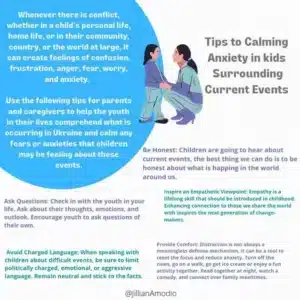
It seems like every time we turn on the news, there is something that triggers fear, anxiety, worry, or concern. It can be difficult for parents and caregivers to know where to start when it comes to talking to kids about current events. When the world around us seems to be in a state of turmoil, we may want to shelter our children from it. But the reality is, kids are perceptive and they are going to hear about things whether we bring them up or not. Here are a few tips to help alleviate fear and anxiety when talking with youth about current events.
- Fear, worry, concern, and anxiety are natural responses to unsettling news. Don’t discount or ignore them.
- Be open and honest and use age-appropriate language.
- Ask questions. If your child seems to be struggling, do a little detective work. Check-in with their emotions, especially if something big has happened recently.
- Counter fear with empathy. Sometimes children will express guilt or sadness that they can’t help or change what is happening. Help them to acknowledge the value of empathy and compassion.
- Stick to the facts. Try not to speak from a place of charged emotions. Speak calmly, clearly, and truthfully.
- Provide comfort. Children thrive under nurturing care. Spend time together, create memories, and offer opportunities for connection.

The current events of today are highly anxiety producing for adults so using these skills will reduce our anxiety as well as that of our children. Modeling the use of these skills will also have the best outcomes! If you still have concerns, reach out to your pediatricians or therapist for more support and direction.
by Jillian Amodio, MSW, Contributor, Mental Health
Disclaimer: The views and opinions expressed on Annapolis Moms Media and its affiliates are those of the authors and/or experts and do not necessarily reflect the official policy or position of Annapolis Moms Media. Any content provided by our bloggers or authors are of their opinion, and are not intended to malign any religion, ethnic group, club, organization, company, individual or anyone or anything.
The published article is available for informational purposes only and is not considered licensed professional advice on any subject matter. By viewing articles/blog posts, the reader understands there is no client relationship between the reader and the publisher and its authors. The article/blog should not be used as a substitute for professional advice from a licensed professional, and readers are urged to consult their own counsel on any specific questions concerning a specific situation.




